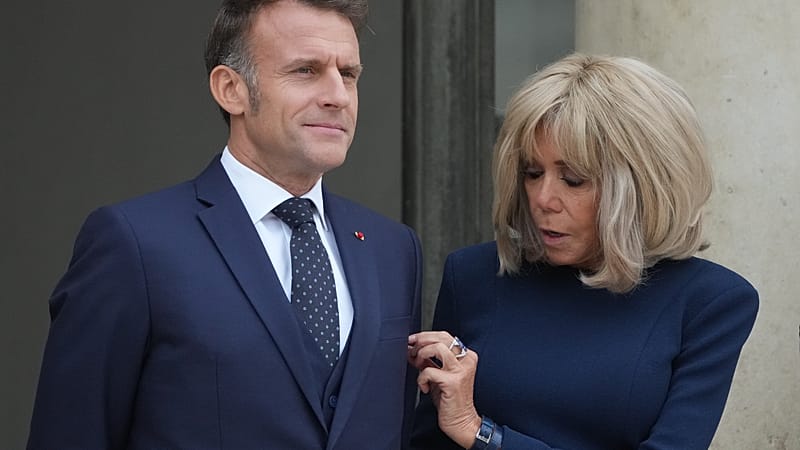France treats cyber harassment differently to rest of EU. These are the other high-profile cases

Ten people defended themselves in front of a Paris court last week against cyberbullying charges brought against them by Brigitte Macron, France’s first lady.
The defendants, eight men and two women between the ages of 41 and 60, are accused of sexist and transphobic harassment over a series of videos and posts that claimed Brigitte Macron was born “a man.”.
The Macron cyber-harassment case is one of many being brought by public figures in France. The country criminalised cyber harassment for the first time in 2014, with a maximum penalty of up to three years' imprisonment and a fine of €45,000.
While some EU states, such as Italy, Austria, and Romania, define cyberbullying and harassment in their penal codes, there are only a handful of countries, including France and Slovakia, that have distinct penalties for it, rather than including it as a case of defamation or regular harassment, according to a briefing note from the European Parliament.
Euronews Next looks at other similar high-profile cyber harassment cases in France.
Imane Khelif
Olympic gold medalist and Algerian boxer Imane Khelif filed an online harassment complaint with a special unit of the Paris prosecutor’s office for cyber harassment after the 2024 Paris Olympic Games.
During the Games, Khelif was on the receiving end of false online claims that she is transgender or a man after her opponent, the Italian Angela Carini, pulled out of their first match because of being in pain from opening punches.
Some of the people cited in Khelif’s cyber harassment complaint include US President Donald Trump, British author JK Rowling and billionaire Elon Musk, who reposted a comment that called Khelif a man, according to the Associated Press.
The case was filed against the social media platform X, Musk’s platform, rather than a specific person, leaving it to French investigators to determine who might be at fault.
In a press release about the charges, Khelif’s lawyer Nabil Boudi called the online comments against Khelif “misogynist, racist and (a) sexist campaign,” against the boxer.
“The unfair harassment suffered by the boxing champion will remain the biggest stain on these games,” Boudi’s statement said.
Euronews Next followed up with Boudi to determine whether the case has been withdrawn or settled. We also asked whether a trial date has been set but did not receive an immediate reply.
In June, World Boxing declared that its boxers will have to undergo mandatory genetic and sex testing, a decision that Khelif is appealing.
Thomas Jolly/Barbara Butch
At least two other people filed cyber-harassment claims after the opening ceremony of the Olympic Games: artistic director Thomas Jolly and DJ Barbara Butch.
French media reported that Jolly filed a claim to the French prosecutor’s office after he was a target of threats and insults that criticised his sexual orientation and “supposedly false Israeli origins.”.
The controversy over the opening ceremonies organised by Jolly stemmed from a tableau titled Festivity, in which Butch and a cast of drag queens portrayed the mythological creature Dionysus. Some conservative critics compared it to a parody of the Christian Last Supper.
A statement from Butch’s attorney Audrey Msellati on Instagram said that Butch was the target of an “extremely violent campaign of cyber harassment and defamation,” that included death, torture and rape threats.
The statement said she filed “several complaints” against these acts and “intends to prosecute anyone who tries to intimidate her in the future,”.
In May, French newspaper Le Monde reported that a French tribunal imposed fines of between €2,000 and €3,000 and up to four months’ prison time for seven people found responsible for Jolly’s cyber harassment.
Five men appeared in a Paris court in September, charged with the campaign against Butch, with French media reporting that prison sentences were requested.
Euronews Next followed up with Butch’s lawyer to see if a sentence was handed down, but did not receive a reply at the time of publication.
Influencers Magali Berdah and Ultia
There have also been several cyber-harassment charges brought by French influencers.
Twitch streamer Carla G, alias Ultia, denounced sexist messages that another Twitch user made during a 2021 video game marathon. She argued in a cyber harassment complaint that she was at the receiving end of a massive online hate campaign.
During a January trial against four men, she told the judge that the harassing messages “came in huge waves, even when [she] didn’t say anything,” according to Le Monde.
“I can’t take it anymore, I want it to stop,” she reportedly said, noting that a psychiatrist had diagnosed her with post-traumatic stress disorder (PTSD).
Three of the four men were sentencedby the Paris tribunal to between six and 10 months in prison, according to Le Monde. Charges against the fourth person were dropped.
Meanwhile, Magali Berdah, an agent for French influencers, received a wave of “insulting and racist” messages after she published a photo of herself in Israel the day after the 7 October 2023, attack by Hamas.
A Paris court found 28 people initially guilty of cyber harassment in 2024 against Berdah and imposed prison sentences of up to 18 months and fines of up to €700, which French media said at the time was the most significant case to date.
Six more people were found guilty by French authorities in her case in April and received sentences of between six and eight months in prison and up to a €500 fine, French media reported. The judgment also asked them to pay Berdah €10,000 in damages.
Today

